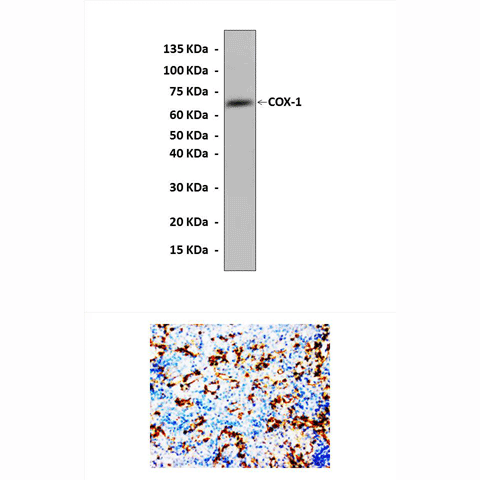Anti-COX-1: Rabbit COX-1 Antibody |
 |
BACKGROUND Cyclooxygenases are key enzymes in the conversion of arachidonic acid to prostaglandin. At present, three COX isoenzymes are known: COX-1, COX-2, and COX-3. COX-3 is a splice variant of COX-1, which retains intron one and has a frameshift mutation; thus some prefer the name COX-1b or COX-1 variant (COX-1v). Different tissues express varying levels of COX-1 and COX-2. Although both enzymes act basically in the same fashion, selective inhibition can make a difference in terms of side-effects. COX-1 is constitutively expressed in nearly all cell types and plays a central role in many normal physiological processes, such as cytoprotection of gastric mucosa and kidney water excretion. COX-2 is a highly inducible gene, activated by cytokines, growth factors, phorbol esters, oncogenes and chemical carcinogens.1 Both COX-1 and -2 (also known as PGHS-1 and -2) also oxygenate two other essential fatty acids – DGLA (omega-6) and EPA (omega-3) – to give the series-1 and series-3 prostanoids, which are less inflammatory than those of series-2. DGLA and EPA are competitive inhibitors with AA for the COX pathways. This inhibition is a major mode of action in the way that dietary sources of DGLA and EPA (e.g., borage, fish oil) reduce inflammation. Pharmacological inhibition of COX can provide relief from the symptoms of inflammation and pain. Non-steroidal anti-inflammatory drugs, such as aspirin and ibuprofen, exert their effects through inhibition of COX.2 Since COX has important influences on metabolic functions and inflammatory responses, finding ways to regulate inflammations without interrupting the normal body process has become critical. Thus drugs that have selective reactions toward COX-2 but not COX-1 become a hot topics.3
REFERENCES
1. Turini, M.E. & Dubois, R.N.: Annu. Rev. Med. 53:35-57, 2002
2. Chen, C. et al: Ann. Surg. 233:183–8, 2001
3. Wu, B. et al: Cell Res. 19:1269-78, 2009
2. Chen, C. et al: Ann. Surg. 233:183–8, 2001
3. Wu, B. et al: Cell Res. 19:1269-78, 2009
Products are for research use only. They are not intended for human, animal, or diagnostic applications.
Параметры
Cat.No.: | CA1027 |
Antigen: | Short peptide from human COX-1 sequence. |
Isotype: | Rabbit IgG |
Species & predicted species cross- reactivity ( ): | Human |
Applications & Suggested starting dilutions:* | WB 1:1000 IP n/d IHC 1:50 - 1:200 ICC n/d FACS n/d |
Predicted Molecular Weight of protein: | 70 kDa |
Specificity/Sensitivity: | Detects endogenous levels of COX-1 proteins without cross-reactivity with other related proteins. |
Storage: | Store at -20°C, 4°C for frequent use. Avoid repeated freeze-thaw cycles. |
*Optimal working dilutions must be determined by end user.
Документы
Информация представлена исключительно в ознакомительных целях и ни при каких условиях не является публичной офертой








